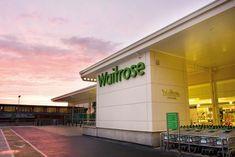
How is it not possible to envy the working conditions of Leckford Estate employees?
Even when raining the estate, owned and operated by Waitrose for over 86 years, is an oasis of calm and beauty. The air is fresh and the views are of the type that inspires paintings and poetry. And it has a fantastic tea room that serves the most exquisite Victoria sponge. What more could you want?
“No matter how difficult a week you may have had, a trip out here always sorts you out,” says Alistair Stone, Waitrose’s buying manager for vegetables. Stone is often on site to visit the mushroom farm, which supplies the supermarket’s entire chestnut mushroom needs. In fact, some 20 to 22 tonnes of the produce are sent out each week. As soon as you step into the building, after first donning paper overalls and hairnets, the earthy smell hits you. It’s like breathing in mushroom soup.
The 4,000 acre estate also boasts an apple orchard from which Cox apples, among others, are supplied and in 2009 a vineyard was planted, with the first bottles of its English sparkling wine due to go in-store in 2014.
However, owning the farm does not just mean the supermarket has opportunities to supply its own stores, it also gives the business an insight into the agricultural world that benefits its relationships with other suppliers.
“We are, if you like, an early indicator in terms of what’s happening with commodities,” says Andrew Lazenby, the estate’s commercial manager. “We feed in through one of the Waitrose trading directors, Heather Jenkins, who sits on our operating board and is actively involved with estate management. That means she has an awareness from both sides of what is going on at the agricultural end of the food supply.”
Lazenby explains how as farmers, they have access to information on what’s happening globally that the retailer may not otherwise be linked into. “There’s a very helpful knowledge pool that means we don’t go and talk to suppliers as an arrogant retailer,” he adds, while negotiating the Range Rover we’re touring the estate in round a very narrow lane. “We talk to them as a true partnership, with a true awareness of the good times as well as the tough times that our farming partners are facing.”
The recent announcement that Waitrose is to sell what has been nicknamed ‘wonky veg’ is a great example of this. The supermarket has recognised the challenges British suppliers have faced with the temperamental weather and rather than let good quality but cosmetically imperfect fruit and vegetables go to waste, they are stocking the produce and pricing it accordingly.
This is not the first time though that the supermarket has stepped in to help farmers. “We’ve had a hailstorm and lost our entire apple harvest for the year and so seeing the impact that can have we’ve introduced in the past ranges of storm-damaged fruit,” explains Lazenby. “Hail gives apples a very delicate, almost invisible marking on the fruit. It doesn’t affect the quality and they’re not bruised. So we have sold it as storm-damaged fruit and communicated to customers that we did so to help the farmers. “
For Stone, one of the benefits of buying from within his own company is that he is constantly updated on the issues that are influencing the costs of production. “When I speak to Andrew about cost-price pressures, cost of oil, cost of compost and labour it rubber stamps what other people are telling you about those inputs,” he explains. “Luckily we have good relations with all our suppliers so we do talk about this with them. [But] it gives you a pragmatic approach to the conversations we’re having with suppliers because we are furnished with some really good information.”
This sympathetic relationship is extended to the way the farm is actually run. Waitrose is committed to nature conservation in the area and hedgerows are allowed to take their wild course. The land is farmed sustainably and only produce that is suited to its soil and climate is grown there. “The farm will continue to evolve and we do have ideas of what we would like to grow here in the future,” says Lazenby.
“Of course we want to farm and we want to make a profit,” adds Stone. “But we want it to be as sympathetic to the environment as we can make it. That’s the Waitrose way.” -



